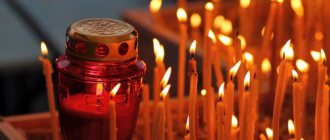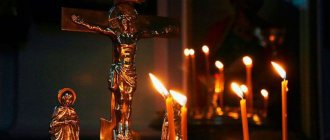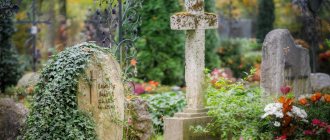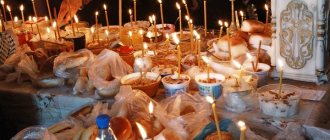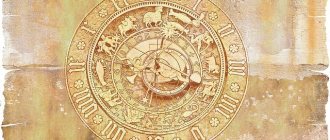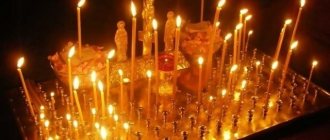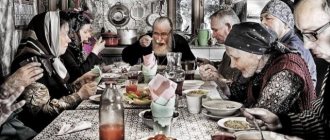In the Orthodox tradition, special attention is paid to the remembrance of the dead. 9 days after death: what it means and how to remember the dead. In this article we will tell you what 9 means after death, what the relatives of the deceased need to do, what rituals to perform and what funeral dishes to prepare. Failure to comply with traditions according to religious scriptures can deprive the deceased of heaven, and bring a grave sin on relatives
Why is it necessary to remember the deceased on the 9th day after death, and how to do it correctly
The meaning of the ninth day after death
Relatives should follow traditions, because the 9th day after death has sacred meaning. In 9 days, the human soul completes its journey begun during life. She is still just looking for her way into a new world for her. Day 3 is the beginning of the afterlife, and 40 is its finale. But 9 is a very important day at the stage of the afterlife journey of the human soul.
9 is a sacred number. After all, for example, in the angelic hierarchy there are 9 ranks of angels. This is celebrated not only in honor of the deceased, but they also give honor to the angels, it is they who will defend him at the Heavenly Judgment. These are the lawyers of souls, they are the ones who turn to God for mercy.
On the 3rd day, the soul of the deceased is still not far from the living. At this time, she is accompanied by a person’s Guardian Angel. Already on the 4th day he accompanies him through the gates of heaven. Until the 9th day he explores Paradise. Without yet knowing what the Lord will say, a person’s soul can know what awaits it in Heaven or Hell. In Eden, a person will rest from the pain that he received in earthly life.
What happens to a person's soul on the 9th day after death? The Lord commands the angels to bring the deceased to his throne. A person with fear appears before the Almighty for the first time. After a difficult conversation, he faces the road to Hell. After the 40th day, the heavenly court will decide further.
Why is it commemorated 9 days after death: from 9 to 40 days is the time of ordeal for the soul. Together with the angel, she goes through some tests. These may be sinful temptations. If everything goes well and the soul can endure the test, then all its lifetime sins will be forgiven at the Heavenly Court.
How to help the soul of the deceased
What does 9 days after the death of a person mean - during this time the soul is busy looking for the path that it will follow next.
It is very difficult to imagine what it will be like. Some people believe in the rebirth of souls after death? In literature you can find out that the reincarnation of souls occurs from 3 to 40 days. At this time, the soul is busy viewing and analyzing its mistakes. There is even an opinion that the soul itself can choose what its subsequent incarnation will be. As they say in Orthodox literature, the righteous go to Heaven, the sinners go to Hell. But on day 9 the soul searches for its path. And it is precisely at this moment that family and friends must let the person go. No one says that the pain and suffering associated with loss can be forgotten. Any human loss is imbued with this. But it is the calming of the soul that is a great thing for the deceased.
And we need to pray, not cry. Through prayer, a deceased person can find peace, stop worrying about those who remain, and go where he is destined to go.
In Orthodoxy it is known that from days 4 to 9 the soul is shown Heaven, from days 9 to 40 - Hell. On the 9th day, the deceased completely forgets all the sorrow that he had in his worldly life. He forgets bodily pain. Sinners' souls repent at this moment. Why are 9 days celebrated after death: it is the prayer of relatives that is a huge support for the deceased person.
Prayers are also needed because the soul appears before the Lord for the first time on the 9th day after death. These days it is customary to order prayer services, remember the deceased, and read prayers for him. In a word, provide him with all possible help. In the church it is customary to ask for the soul of the deceased so that it can be added to the souls of angels. A relative can become someone's Guardian Angel. People believe that deceased relatives are always nearby and will always help.
ON THE REMEMBERING OF THE DEAD ACCORDING TO THE STATUTE OF THE ORTHODOX CHURCH
204 Our Church Charter, with great stinginess, so to speak, establishes church festivals, rightly reasoning that what is often repeated becomes habitual, ordinary, and ceases to produce the completely desired effect. Overburdening the divine service with holiday services is not useful, because it reduces the holiday service to everyday service. That is why the Church Charter is so stingy regarding holidays with polyeleos. Even on the Lord's holidays of the Indict, that is, New Summer on September 1, the renovation of the Church of the Resurrection in Jerusalem on September 13, the Origin of the Honest Trees on August 1, and the Image Not Made by Hands on August 16, the main services are only with doxology (although September 1 is the polyeleos sign). Having written under December 25: “EASTER, THE THREE-DAY HOLIDAY,” the ancient compilers of the Charter did not consider it a disparagement of the One Who served the mystery of the Incarnation by scheduling a service with only doxology for December 26 at the “Cathedral of the Most Holy Theotokos.” And on the third day of Easter there is no doxology. In accordance with this attitude of the Church towards the establishment of holidays, in our BASIC Charter there are very few polyeleos holidays, holidays of medium solemnity, we can’t even count them up to ten. These are the feasts of: 1) the Archangels on November 8, 2–3) the great martyrs on March 9 and October 26, 4) the Equal Apostles on May 21, 5–6) the ecumenical saints on January 25 and 27, 7–8) the founders of monasticism on September 28 and January 11. All other memories, marked in our Typikon with a polyeleos sign, are either of later origin, as the memory of new Russian wonderworkers, canonized at the Macarius Councils of the 16th century and to this day, or are preserved in our Charter as a reminder of the local holidays of those monasteries and temples, the charters of which influenced one or another influence on the formation of our Typikon. Thus, polyeleos on February 24 and May 25 are local holidays of the Studite monastery, dedicated to the Forerunner and keeping part of its holy head. Polyeleos on December 13 is a local holiday of Constantinople, where the monastery of the Fifth Martyrs was located and where their veneration especially intensified after their miraculous appearance on the day of their memory in the monastery dedicated to them. On July 20, the following warning is made in the menaion: “Be aware that in the Greek printed menaia and handwritten charters, likewise in the Slavic handwritten and printed charters, the service of Elijah the Prophet is laid down in sixfold form with Octoechos.” The main six-day service was expanded to a full holiday service in Rus' out of great love for the prophet of the Russian people. In the middle of the 15th century, the famous compiler of the lives and services of Russian saints, Pachomius the Serb, compiled the 2nd canon to the prophet, now published in the Menaion. On the day of his council, July 13, there is not even a doxology for the great evangelist Archangel Gabriel; only the service for six is sung. Also to Archangel Michael on the feast of his miracle on September 6th. This is by no means a disparagement of the great Archangels. By appointing a festive service of the least solemnity for these Two Archangel holidays, the Church Charter does so, guided by a sense of proportion. After all, both Archangels are celebrated on November 8 with a common solemn celebration, even with a vigil so rarely appointed. In addition, both Archangels are remembered and glorified almost every week on Mondays (if there is no holiday on Monday) along with all the Ethereal Powers. And the Archangel Gabriel will also be glorified on the Annunciation and March 26th. Therefore, on the holidays of September 6 and July 13, only the sixfold service is assigned to these Archangels. In the same way, guided by a sense of proportion, our original Charter, having ranked the memory of the supreme apostles on June 29 among the great holidays and appointing a vigil for the feasts of the Theologian on September 26 and May 8, established a celebration for all other apostles from the 12th and evangelists only with doxology, and for some (9 August), it seems, without doxology. Even the First Called, whom Constantinople also considers its apostle, has a complete festive service of relatively late origin - it did not exist when the service menaions were initially translated into Slavic. Only under Patriarch Hermogenes “the full service was transferred from the Greek language to the Russian language” (Golubtsov. Official of the Moscow Assumption Cathedral, p. 168). And in the Book of Hours of 1652, vigils for the apostolic feasts are appointed only on June 29, September 26 and May 8. Polyeleos was assigned only to the Apostle Andrew. In memory of the apostles James Zebedee, Bartholomew, Thomas, James Alpheus and Simon, there is no holiday sign. Bearing in mind all these ancient Russian customs regarding the celebration of the memory of the holy apostles, is it possible to assume that our pious ancestors revered the holy apostles less than we do, as if they were somewhat disdainful of their memory? Of course not! But our ancestors strove to adhere to measure and order in everything. Ancient Moscow and northern Rus' strictly observed the LIMITS AND CHARTERS OF THE FATHERS. Southern Rus' treated the Rules and rites of the Church with greater freedom and often multiplied prayers, services and festivities beyond the need, sometimes not even fully corresponding to the spirit of the Orthodox Church Rules (like passions borrowed from the Latins). It was there that for the first time the old boundary that the fathers had set (Prov. 22:28) regarding the holidays was moved, and celebrations with polyeleos were established for all the apostles from the 12th year. Perhaps some of the liturgical innovations introduced in the south made sense there as one of the means of combating the growing propaganda of Latinism. Perhaps the establishment of a polyeleos service in memory of all the apostles there was necessary as a protest against the primacy of the Apostle Peter preached by Rome. In central and northern Russia there was no such need. However, the South Russian bishops, when they found themselves in the majority in the newly established Synod, not wanting to be guided by the old Russian proverb “don’t meddle in someone else’s monastery with your own rules,” tried to introduce THEIR South Russian orders throughout Russia, and the synodal decree of September 20, 1721 was A widespread celebration with polyeleos was established for all the apostles from 12 and the evangelists. It is characteristic that for the general feast of the Council of the 12 Apostles on June 30 in our Charter, with the polyeleos holiday sign, in the very sequence of the service, the completely ancient order of the statutory service with doxology is still preserved in conjunction with the service of the post-feast of the Supreme Apostles, and on August 25, on the day of the secondary in memory of the Apostle Bartholomew, one of the twelve, our liturgical books still indicate ONLY the SEX service. Other apostolic services, which were previously with doxology, obviously, after 1721, were replenished to polyeleos. But most of these additions are very unskillful, as if sewn with white threads to the ancient basis, and only once again confirm that they are of the latest, sometimes accidental, origin, that the original, ancient, therefore established by the fathers, structure of the services of these holidays is different. A careful consideration of the composition of the apostolic services will convince us of this. One of the distinctive features of the polyeleos service is the paremias at Vespers. Naturally, for the holidays. Peter and John's proverbs are taken from the letters of these apostles. And the proverbs to the Theologian and the Supreme One are deliberately noted in the church Apostle. Perhaps one can consider it more or less appropriate to read on the feast of the Apostle Andrew as a proverb conceived from the epistles of his holy brother Peter, who is repeatedly mentioned in the service. I don’t know if there were paremias in that Greek service to the Apostle Andrew, from which a Slavic translation was made under Patriarch Hermogenes? But the Church Apostle does not indicate the proverbs for November 30, and the relatively large size of these proverbs, especially the first, suggests that they were included in the service in Rus'. For all other apostolic commemorations, proverbs are assigned purely by chance. Sometimes they do not even correspond at all to the instructions of the general menaion, which (also by chance) assigns to the memory of the only apostle those proverbs from the epistles of St. John the Theologian, which the church Apostle indicates for the feast of the only apostle - John, and for the memory of two or more apostles he appoints paremias laid on June 29, in memory of the two supreme apostles. On October 6, without special relation to the memory of the celebrated apostle, proverbs from the Epistles of John, James and Jude, and on October 9 and 18 the same proverbs are repeated, obviously because they were already printed in the October Menaion. In the November menea there were already paremias on the 30th. They are recommended to be read on both the 14th and 16th. April 30th in memory of Ap. James Zebedee, completely inappropriate proverbs from the Apostle James, the brother of God, are assigned, groundlessly giving reason to consider the celebrated apostle the author of this epistle, which he was not. And on April 25, the same proverbs are assigned, because they are already included in the April menaion on the 30th. In the same way, on May 10, the proverbs placed in the same menea on the 8th are assigned, and on June 11, those printed under the 29th. On August 9th, a completely unusual proverb from Acts, from which book there are never any proverbs. And only on June 19 are the proverbs from the book of the celebrated Apostle assigned, but they are not noted in the liturgical Apostle. For the festive service with polyeleos, lithium stichera are not necessary. But the replenishers of the apostolic services decided to provide lithium stichera for these services. This further revealed the random nature of the replenishment. For all October and November apostolic commemorations, the same stichera are assigned, placed on the praises and in the general service of the one apostle, and in this latter included, in all likelihood, from April 30, for which day they were originally compiled as stichera on “The Lord cried.” For the rest of the apostolic commemorations, with the same holiday signs, there are no lithium stichera, so it becomes completely incomprehensible why the Evangelist Luke has stichera, but the other evangelist, Mark, does not; James Alpheus and Philip have it, but James Zebedee, Simon the Canaanite and Bartholomew do not? For polyeleos services, sedals for polyeleos are needed. In most apostolic services they are either from the general menaion (October 6, 9, May 10, June 19) or the repetition of sedals from the 3rd song of the canon (November 14 and 16, June 11). We also need a stichera on Psalm 50 for the holiday services. In the apostolic services, it is either a repetition of one of the stichera with “I cried to the Lord” (April 25, August 9), or verse (April 30), or completely colorless (November 14, June 11 and 19 - the last two memories are the same, in the first case in the plural, in the second - in the singular). On October 18, the sedalion prescribed by the 2nd kathisma from the same service is assigned as a stichera - an almost impossible thing, for troparia, which include sedalny, are almost never transferred to the category of stichera, which have a different melody from the troparion. There is one exception - the Theotokos: “Blessed are you the Virgin Mary,” used as the final stichera on praises, and as a sedalna on the 2nd kathisma per week, and on the feast of the icon of the Mother of God, called the Joy of All Who Sorrow, at prayer services instead of the troparion it is sung stichera: “Joy to all who mourn.” But these are the Theotokos - both 2nd voice, in which the verse and troparion chanting have more similarities than in any other voice, than, in particular, in the 3rd voice, on which the sedalen, altered with small ones, was placed in the service of the Apostle Luke editorial changes in the stichera according to the 50th psalm while maintaining the same voice, although according to the 50th psalm there is never a stichera in the 3rd tone, but always in the 6th, for in the 6th tone the psalm of the 50th preceding this stichera is sung . On October 9, the newly composed stichera on Psalm 50 has the inscription: Similar: Wives will hear. But from the point of view of the Church Charter, this is complete absurdity! The wives will hear - this is the LIGHT of the week of the Myrrh-Bearers, and the stichera and the lamps are two completely different things and the stichera can never be performed like a lamp. During the after-feast, with the saint and the doxology at Vespers, the poems of the holiday and only the Glory of the saint are relied upon. So this is, for example, August 9, where verse stichera to the Transfiguration are printed along with it. The replenishers of the apostolic services forgot this rule and, not finding the stichera of verse at Vespers on April 30, which were supposed to be from the Triodion, so as not to leave, as it seemed to them, an empty space, they repeated the stichera of praise from the same service. On August 9, the Apostle Matthew, according to ancient regulations, as noted above, had a service even without doxology. In the present service, three stichera of the Transfiguration are placed on the praises, similar to: “The House of Euphraphs,” then three stichera and a glory to the apostle, all borrowed from the general menaion, and on and now again the Transfiguration stichera, the same is similar: “House of Euphraphs.” This last one is similar in the main services - it is appointed only for verse ones and never for praise ones. Therefore, it is quite obvious that initially in the service on August 9 at Matins there were no stichera on the praises, there were only one stichera of the Transfiguration on the stichera. The Apostle did not even have a stichera for Glory. The additions to the service transferred the verse stichera of the holiday to the praises, adding to them the stichera to the apostle borrowed from the general menaion. All of these statutory lapses once again confirm how hasty and how insufficiently thought out the decision was to change the order of worship established by the ancient fathers on the feasts of the holy apostles.
How to organize a funeral
The wake on the 9th day after death must include kutya. This is a ritual and traditional dish for the funeral table. It is prepared not only for funerals, but sometimes also for holidays. For the funeral meal, kutya is made from wheat, sugar, and honey. There is also kutia made from rice and raisins.
What should the relatives of the deceased do on the 9th day after death?
What to serve
- Kutia is not a simple dish; everything that is prepared for 9 days after death carries a sacred meaning. Seeds in kutya are the birth of a new life. It symbolizes the resurrection of man in the afterlife.
- Sugar, honey, jam are a symbol of sweet life after death. Kutya is consecrated in the church. But if this is not possible, then it’s okay. You can sprinkle it with holy water or simply read a prayer over it.
- What is served for 9 days after death: jelly or compote at the funeral table - this is also a mandatory dish. Any porridge can be on the table; sometimes pancakes and pies are prepared so that the filling is sweet.
- Fish dishes can also often be found at the funeral table; sandwiches with fish, sprats, herring and other fish snacks are approved. Borscht and noodles can be served as a first course. For hot kuru, roast.
- The feast on a sad occasion begins with the prayer “Our Father.” You can read it both aloud and silently. The first dish served is kutia.
- Alcohol is prohibited. Although there is drinking at any wake, traditionally there shouldn't be. Drunkenness is a sin; indulging in sin at a wake can harm the soul of the deceased. According to the same sign, you should not carry alcohol to the cemetery.
- You should not put a lot of food on the table, because gluttony is a sin. The table needs to be modest, without frills and pathos. Eating doesn't matter. The important thing is that people gathered to remember the person, and not to indulge in gluttony.
- But even if you rid the funeral table of luxury, then everything must be calculated so that there is enough for everyone. People come uninvited and therefore it is better to have a little in reserve. What remains after the funeral table must be distributed to the poor. Products should not be thrown away under any circumstances.
Is it worth inviting guests?
- On the ninth day, people are not invited to the wake; they are called uninvited. This means that people come to remember the person themselves if they want. It is not recommended to invite people to the funeral. People should come and remember the deceased themselves.
- According to tradition, there must be relatives, people who washed the deceased, those who made his coffin, and grave diggers. If all this was done by people from ritual services, then the tradition loses its relevance.
How to behave at a wake
You cannot laugh, have fun, or talk loudly at the table. What they say on the 9th day after death is that you cannot remember the deceased from the bad side, his unseemly actions, addictions. It’s either good or not good about the deceased.
Until the 40th day, a decision will be made about where he is in Heaven or Hell, so the negative will weigh on the bad side of the scales, and this directly leads to a terrible sentence.
The appearance of those who come should also be appropriate. Women's heads should be covered, preferably with a scarf, and their hair should be tied up. Men must remove their hats when entering the premises. Black mourning is worn only by family and friends.
The Importance of Spiritual Life
Many holy fathers were awarded various revelations, about which they compiled special works. From there it is known exactly how the soul ascends to the heavenly abodes. The more people sincerely ask for the deceased, the easier it is for her to be on the other side.
About the author About the book
On the 9th day after death, the soul begins to undergo tests of all possible passions. There are 20 species in total. Here there is theft, and carnal pleasures, even such a seemingly insignificant sin as idle talk, slander, and swearing. Various written works and icons are dedicated to the ordeals. Horrifying images of pain and torment evoke rather unpleasant feelings.
But it is quite possible that demons will not frighten, but, on the contrary, seduce the soul flying by. Trying to detain her, to lure her with what she loved very much during her life. A very important lesson here is that the sinful soul independently chooses the path to hell, not to God. The Lord is not angry with people - they themselves turn away from Him by submitting to their passions.
Passion differs from sin in that it can enslave a person, force him to strive at any cost to satisfy his destructive desires. No wonder this word is translated as “suffering.” After all, getting what you really wanted does not make a person happy. He only rejects rewards beyond the grave, because there too he will be subject to evil influence. Only it will be a thousand times stronger.
When 9 days come after death, this means that the spirit ascends to worship the Lord. After this, until the forties, the soul is shown the hellish abyss and it is tormented by the evil deeds that it committed during its life. The fervent prayer of your neighbors can ease these wanderings, which can plunge you into horror and despair. While on earth, a person can educate his soul. There are proven means for this - fasting, prayer, various types of abstinence. It will no longer be possible to resort to them for the coffin.
Being in the body, a Christian can get a respite from the feelings that overwhelm him - be it anger or lust. Simple sleep or a change in activity helps. Freed from the body, he will perceive spiritual reality much more acutely. On the other side, the soul is attracted to what it wanted here on earth. So she can fall into the clutches of demons. Prayers and fasting can get rid of them, which loved ones must undertake if they want to alleviate the fate of the deceased.
- 40 days after death - what happens to the soul
- Funeral service for 9 days after death - more details here
- How to remember the deceased on the anniversary of death -
It is very important to understand that simply by submitting a note and standing at the Liturgy, you are only performing a ritual. It will be filled with meaning and become effective only when a person forces himself to put his whole soul into prayer.
What should relatives do on day 9?
The first 9 days after death, how to spend them for relatives. The work of relatives will benefit the deceased in his next life or help him get to heaven - here who already believes in what. What happens on the 9th day after death: people and angels unite so that the deceased goes to Paradise. Memorial days are not just a formality. This is the time when the living helps the one who has died.
Go to church
What do they do for 9 days after death - going to church is mandatory. There you need to order a prayer service and light candles for the repose. Pray at the icons, asking for mercy for the deceased, so that God and the angels would be favorable to him. Of course, you can say prayers at home, but a prayer service is still a necessary trip to church. Not only relatives can read prayers; friends and acquaintances can also pray for the repose of the soul; the more people pray, the more favorable the decision of the Heavenly Court will be. You can pray to God, or you can pray to any saint.
Visit the cemetery
- How to remember on the 9th day after death: by lunchtime you need to go to the grave of the deceased and visit him. Clean it up, take away the trash. Adjust the wreaths, pick fresh flowers. If you have a lamp, light a candle in it. Don't chat, don't shout. Remember the deceased with kind and good words.
- A funeral in a cemetery is bad manners, as ancient omens say. You shouldn’t do this, even priests talk about this. You cannot drink alcoholic beverages. Do not harm the soul of a deceased person.
- For 9 days after death, you should not leave alcohol on the grave in the cemetery; you should not leave shot glasses or glasses filled with alcohol. Pouring alcohol onto the mound is prohibited. You can leave sweets or other treats, grains for the birds to peck. Baked goods can be distributed to strangers in exchange for their souls.
Remember the deceased
When talking about the deceased, you need to say only good and kind words, remember his good deeds and actions. Now the Lord listens very much to what they say about a person. Negativity will only ruin everything. There is no need for bad words, they can do harm. Speak only kind things.
On this day you need to give alms to the poor. It can be anything: money, things, food. You can give away what is left after the funeral table. In the house you need to put and light a lamp, put a glass of water and put a piece of bread. Tokens of attention are placed near the portrait of the deceased, and the portrait is tied with a black ribbon. On the 9th day, you can remove the curtains from the mirrors, leaving them only in the room of the deceased.
How is the ninth day after death counted?
- How to count 9 days after a person's death is quite simple. The first day is the day the person died, no matter whether it was morning or late evening. The main thing is before midnight. This day in a year will be a year. This is how we count all the days.
- A common mistake is to count 9 days after death. For example, a person died on the 18th, we add 9, but 27 is not the ninth day. The ninth day will be the 26th.
- This date does not depend on when the person was buried. Usually buried on the 3rd day. But various circumstances may push back this date. But days 9 and 40 do not change their numbers. The count is kept only at death.
- If a person died during Great Lent, what do believers who observe fasting do? At this time, if day 9 falls on a weekday, it must be moved to the next weekend.
